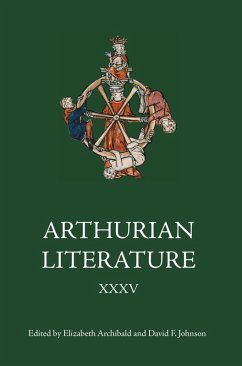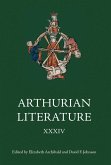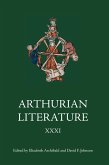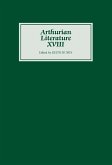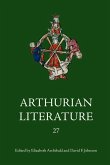The continued influence and significance of the legend of Arthur are demonstrated by the articles collected in this volume.
The rich vitality of both the Arthurian material itself and the scholarship devoted to it is manifested in this volume. It begins with an interdisciplinary study of swords belonging to Arthurian and other heroes and of the smithswho made them, assessed both in their literary contexts and in "historical" references to their existence as heroic relics. Two essays then consider the use of Arthurian material for political purposes: a discussion of Caradog's Vita Gildae throws light on the complex attitudes to Arthur of contemporaries of Geoffrey of Monmouth in a time of political turmoil in England, and an investigation into borrowings from Geoffrey's Historia in a chronicle of Anglo-Scottish relations in the time of Edward I, a well-known admirer of the Arthurian legend, argues that they would have appealed to the clerical élite. Romance motifs link the subsequent pieces: women and their friendships in Ywain and Gawain, the only known close English adaptation of a romance by Chrétien, and the mixture of sacred and secular in The Turke and Gawain, with fascinating alchemical parallels for a puzzling beheading episode. This is followed by a discussion of the views on native and foreign sources of three sixteenth-century defenders of Arthur, John Leland, John Prise and Humphrey Llwyd, and their responses to the criticisms of Polydore Vergil. In twentieth-century reception history, John Steinbeck was an ardent Arthurian enthusiast: an essay looks at the significance of his annotations to his copy of Malory as he worked on his adaptation, The Acts of King Arthur and his Noble Knights. The volume moves to even more recent territory with an exploration of the adaptations of Malory and other Arthurian writers that occur in the comic books by Geoff Johns about Arthur Curry, aka Aquaman, King of Atlantis. The book is completed by a reprint of a classic essay by Norris Lacy on the absence and presence of the Grail in Arthurian texts from the twelfth century on.
ELIZABETH ARCHIBALD is Professor of English Studies at Durham University, and Principal of St Cuthbert's Society; DAVID F. JOHNSON is Professor of English at Florida State University, Tallahassee.
Contributors: Richard Barber, Mary Bateman, Christopher Berard, William J. Fowler, Natalie Goodison, Norris Lacy, Andrew Rabin, Carl Sell, Elaine Treharne, Usha Vishnuvajjala
The rich vitality of both the Arthurian material itself and the scholarship devoted to it is manifested in this volume. It begins with an interdisciplinary study of swords belonging to Arthurian and other heroes and of the smithswho made them, assessed both in their literary contexts and in "historical" references to their existence as heroic relics. Two essays then consider the use of Arthurian material for political purposes: a discussion of Caradog's Vita Gildae throws light on the complex attitudes to Arthur of contemporaries of Geoffrey of Monmouth in a time of political turmoil in England, and an investigation into borrowings from Geoffrey's Historia in a chronicle of Anglo-Scottish relations in the time of Edward I, a well-known admirer of the Arthurian legend, argues that they would have appealed to the clerical élite. Romance motifs link the subsequent pieces: women and their friendships in Ywain and Gawain, the only known close English adaptation of a romance by Chrétien, and the mixture of sacred and secular in The Turke and Gawain, with fascinating alchemical parallels for a puzzling beheading episode. This is followed by a discussion of the views on native and foreign sources of three sixteenth-century defenders of Arthur, John Leland, John Prise and Humphrey Llwyd, and their responses to the criticisms of Polydore Vergil. In twentieth-century reception history, John Steinbeck was an ardent Arthurian enthusiast: an essay looks at the significance of his annotations to his copy of Malory as he worked on his adaptation, The Acts of King Arthur and his Noble Knights. The volume moves to even more recent territory with an exploration of the adaptations of Malory and other Arthurian writers that occur in the comic books by Geoff Johns about Arthur Curry, aka Aquaman, King of Atlantis. The book is completed by a reprint of a classic essay by Norris Lacy on the absence and presence of the Grail in Arthurian texts from the twelfth century on.
ELIZABETH ARCHIBALD is Professor of English Studies at Durham University, and Principal of St Cuthbert's Society; DAVID F. JOHNSON is Professor of English at Florida State University, Tallahassee.
Contributors: Richard Barber, Mary Bateman, Christopher Berard, William J. Fowler, Natalie Goodison, Norris Lacy, Andrew Rabin, Carl Sell, Elaine Treharne, Usha Vishnuvajjala
Dieser Download kann aus rechtlichen Gründen nur mit Rechnungsadresse in A, D ausgeliefert werden.

